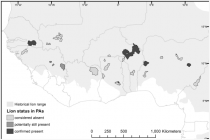Blog Archive: January 2014
23 January 2014

Lion status in West African protected areas within lion range.
© P. Henschel, L. Coad, C. Burton, B. Chataigner, A. Dunn et al. (see footnote).
A recently published study showed that the lion in West Africa is now critically endangered and faces extinction. From one angle, this would be just one of the large (though unknown) number of species that has previously faced extinction or has even become extinct. But the risk of extinction of some species give more reason for pause than others. Surely the lion – a cultural icon for cultures across the world since time immemorial – deserves a moment of reflection.
The cited study describes how the lion was once the most successful large carnivore. Its range extended from South Africa, across Eurasia, and into the southern United States. Today, the lion’s range is restricted to Africa, with a population of the Asiatic sub-species in India. Lions in Africa have lost 75 percent of their range in the last 100 years. (more…)
20 January 2014
On 16 December 2013, the fourth SHARES Debate entitled Protecting the Arctic area – a responsibility of the Netherlands? was held in Amsterdam. The panel consisted of three speakers: Louwrens Hacquebord, René Lefeber, and Daniel Simons. André Nollkaemper acted as moderator. This blog post highlights the main parts of the debate.
Background – changes and threats
Through the melting of the ice of the Arctic, as a consequence of global warming, new economic opportunities for states and businesses arise. Areas that until recently were covered in ice are now opening up, creating, for example, permanent navigational routes between Asia and Europe, and enabling the exploitation of oil and gas resources that had been previously located in inaccessible areas. The Netherlands, as well as companies incorporated in the Netherlands, are among the many actors that want to capitalise on these new opportunities. The increase of economic activities can pose significant risks to the fragile ecosystem of the Arctic. This raises a fundamental question: who is responsible for the management, use and protection of the Arctic area? In this complex situation, question arise over the role and responsibility of the Netherlands and other actors, including Dutch companies such as Van Oord, Boskalis and Shell. (more…)
17 January 2014
Central American regional relations don’t often hit the international news headlines. Yet for those of us with an interest in shared responsibility it would be worth keeping an eye on Nicaragua and Costa Rica. Their often tempestuous relationship touches on many of the issues raised by the complex socio-political and historical contexts, involving interconnected and interdependent realities and a multiplicity of different actors, in which the law of international responsibility is asked to do its work. Accordingly, this blog reflects upon shared responsibility in three areas; the environment, immigration and development, in light of the role played by states and by non-state actors from international organisations as diverse as the Ramsar Secretariat and the World Bank to organised armed groups and multinational corporations. (more…)
15 January 2014
This is our News Items Overview of 16 December 2013-15 January 2014, a summary of recent news relating to shared responsibility. (more…)
6 January 2014
Since the end of the Cold War, the promotion of democracy has increasingly come to be considered a matter of legitimate concern for the international community. In light of this, it seems pertinent to ask whether international law offers us a framework for understanding the shared obligations and responsibilities of the international community with respect to the democratic crisis currently taking place in Honduras.
The 2009 military coup in Honduras and its aftermath
It is a common story in the annals of Central and Latin American history. A military coup (reportedly backed by the United States) deposes a democratically elected President whose program of leftist social and economic reform has upset powerful elites. This is what happened in Honduras when, in the early hours of 28 June 2009, then President Manuel Zelaya was dragged from his bed by soldiers and, still in his pyjamas, taken to a nearby air force base and flown into exile. Since being elected in 2006 Zelaya had increased the minimum wage by 80%, introduced free education for all children and embarked upon a program of agrarian reforms, threatening the interests of the economic, political, military and religious oligarchy which had ruled Honduras since independence. (more…)
